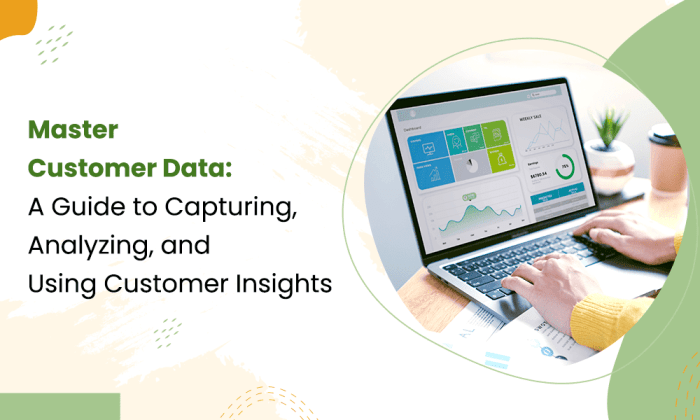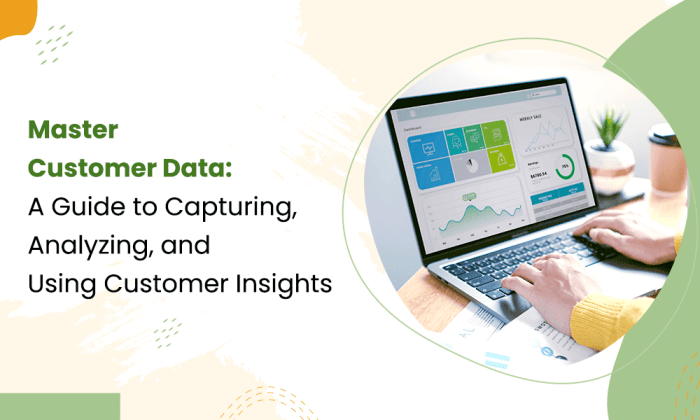Using Customer Data in Marketing sets the stage for this enthralling narrative, offering readers a glimpse into a story that is rich in detail with an American high school hip style and brimming with originality from the outset.
From exploring the importance of customer data to discussing effective strategies for utilization, this topic delves into the dynamic world of marketing fueled by data insights and personalized approaches.
Importance of Customer Data in Marketing: Using Customer Data In Marketing

Customer data plays a crucial role in shaping effective marketing strategies by providing valuable insights into consumer behavior and preferences. With the right data analysis, businesses can tailor their marketing efforts to target the right audience with personalized messages and offers.
Enhancing Marketing Strategies
Utilizing customer data allows marketers to create targeted campaigns that resonate with their audience, leading to higher conversion rates and ROI. By segmenting customers based on their demographics, purchase history, or online behavior, businesses can deliver relevant content that drives engagement and loyalty.
Key Benefits of Using Customer Data
- Improved targeting and segmentation for more personalized marketing
- Enhanced customer experience through relevant messaging and offers
- Increased customer engagement and loyalty
- Optimized marketing spend by focusing on high-value customers
Customer Engagement and Retention
By analyzing customer data, businesses can better understand their customers’ needs and preferences, allowing them to create more personalized experiences that foster long-term relationships. From targeted email campaigns to personalized recommendations, customer data enables brands to build stronger connections with their audience.
Successful Marketing Campaigns Driven by Customer Data
One notable example of a successful marketing campaign driven by customer data analysis is Amazon’s personalized product recommendations. By leveraging customer browsing history and purchase behavior, Amazon delivers tailored product suggestions that drive sales and enhance the overall shopping experience.
Types of Customer Data Used in Marketing
Customer data is essential in marketing to understand and target the right audience effectively. There are different types of customer data that marketers utilize to tailor their strategies and campaigns.
Demographic Customer Data
Demographic data includes information such as age, gender, income, education level, and location. Marketers use this data to create targeted campaigns that resonate with specific demographics. For example, a clothing brand might use age and gender data to promote their products to young adults or women.
Behavioral Customer Data, Using Customer Data in Marketing
Behavioral data tracks how customers interact with a brand, such as their browsing history, purchase behavior, and engagement with marketing campaigns. This data helps marketers understand customer preferences and tailor personalized recommendations. For instance, an e-commerce site can use purchase behavior data to suggest products similar to ones a customer has bought before.
Transactional Customer Data
Transactional data includes information about customers’ past purchases, order history, and payment methods. Marketers can use this data to create loyalty programs, offer personalized discounts, and send reminders for replenishment. For example, a grocery store can analyze transactional data to send targeted offers on frequently purchased items.
Collecting and analyzing customer data from various sources is crucial for marketers to gain insights into their target audience and make informed decisions. By segmenting customer data based on demographics, behavior, or transactions, marketers can personalize their marketing efforts and deliver relevant messages to individual customers. This level of personalization not only enhances customer experience but also drives higher engagement and conversions.
Strategies for Effectively Using Customer Data
Utilizing customer data effectively is crucial for successful marketing campaigns. By collecting, storing, and analyzing data ethically, businesses can better understand their customers and tailor their marketing efforts accordingly.
Collect, Store, and Analyze Customer Data Ethically
- Implement clear data privacy policies and obtain consent from customers to collect their data.
- Securely store customer data to prevent unauthorized access or data breaches.
- Analyze data in compliance with data protection regulations to ensure ethical use.
Leverage Customer Data for Targeted Advertising and Personalized Messaging
- Segment customers based on their preferences, behaviors, and demographics to create targeted ads.
- Use customer data to personalize marketing messages and offers for a more personalized customer experience.
- Utilize customer data to retarget customers who have shown interest in specific products or services.
Create Customer Personas Based on Data Insights
- Analyze customer data to identify common traits, behaviors, and preferences among different customer segments.
- Create detailed customer personas representing various customer segments to tailor marketing strategies effectively.
- Use customer personas to develop targeted campaigns that resonate with specific customer groups.
Role of AI and Machine Learning in Optimizing Marketing Strategies
- Utilize AI and machine learning algorithms to analyze vast amounts of customer data quickly and accurately.
- Personalize marketing campaigns based on predictive analytics to target customers with relevant offers.
- Optimize marketing strategies by leveraging AI insights to improve customer engagement and conversion rates.
Challenges and Considerations in Using Customer Data

In the world of marketing, utilizing customer data can present various challenges that businesses need to navigate effectively. From data quality issues to privacy concerns, it’s essential to address these challenges to ensure successful marketing campaigns.
Common Challenges Faced in Using Customer Data
- Difficulty in collecting accurate and relevant data from customers.
- Managing and analyzing large volumes of data to extract valuable insights.
- Ensuring data security and compliance with privacy regulations.
- Dealing with data silos and integration issues across different systems.
Importance of Data Privacy and Compliance Regulations
Maintaining data privacy and complying with regulations such as GDPR is crucial for building trust with customers. It’s important to prioritize data protection and transparency to avoid any legal consequences and maintain a positive brand reputation.
Strategies to Overcome Data Quality Issues and Ensure Accuracy
- Regularly clean and update customer databases to eliminate outdated or inaccurate information.
- Implement data validation processes to ensure the accuracy and consistency of customer data.
- Invest in data quality tools and technologies to enhance the overall quality of customer data.
Balancing Personalization with Customer Privacy Concerns
Finding the right balance between personalizing marketing efforts and respecting customer privacy is essential. Businesses can achieve this by being transparent about data usage, providing opt-in options for data collection, and giving customers control over their personal information.
